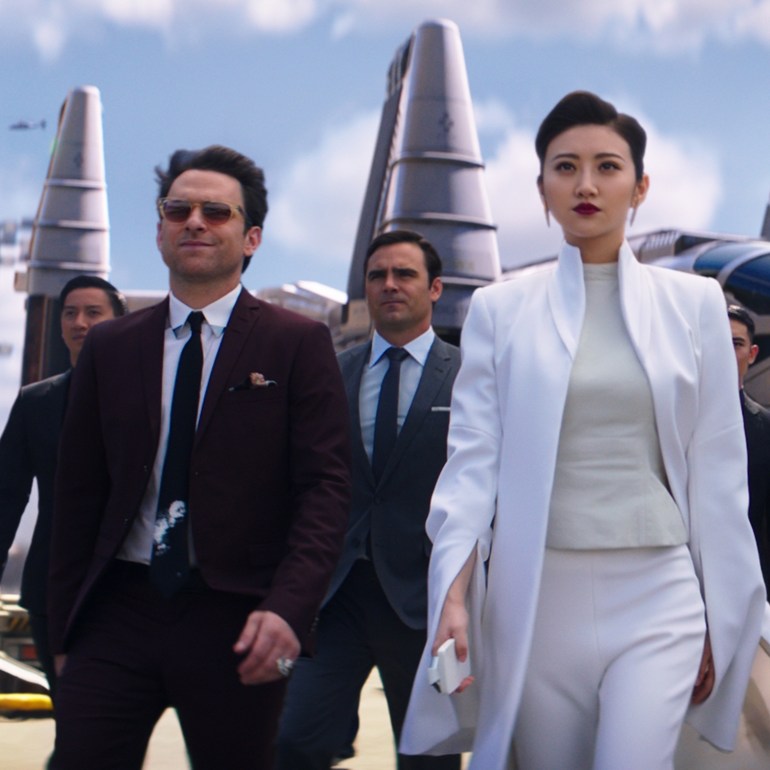Dustin Clare (third from left) in ‘Pacific Rim: Uprising.’
It’s no secret that the traditional model for releasing the majority of Australian films at home and internationally is broken.
Actor-producer-distributor Dustin Clare is pursuing what he believes is a viable alternative. Clare’s Fighting Chance Films is releasing documentaries and narrative features on VOD platforms simultaneously in Australia and worldwide, sometimes preceded by a limited theatrical run in Oz.
“As a distributor we saw a gap in the market for niche titles from Australia, New Zealand, Canada, the US and France,” Clare tells IF. “The bigger distributors steer away from these smaller titles which may not make sense for them but they make sense for us because we are operating on a different scale.
“We’re looking for worldwide rights in many cases. The volume in terms of eyeballs does not exist here in Australia. With online release you are not waiting 12 months or two years to see the first dollar. To me the system is broken when the filmmaker spends all the time and money and carries the risk to make the film.”
While Clare declines to reveal revenues, he names Canadian director Jonathan Taggart and producer Phillip Vannini’s Life Off Grid, which profiled Canadians in every province and territory who chose to build their lives around renewable energy, as one of Fighting Chance Films’ biggest successes last year.
Among other titles that have performed well are two from Kiwi filmmakers, director Alyx Duncan’s The Red House, an experimental documentary about her parents and childhood home, and Stephen Kang’s drama Desert.
US director Stephanie Soechtig’s Sundance hit Under the Gun, which looks at families impacted by the mass shootings in Newtown, Connecticut, Aurora, Colorado, Isla Vista, California and Tucson, Arizona, also performed well.
“It can take some of our narrative features six to 12 months to find their audience online but when it’s found you are getting a consistent number of views with those titles,” he said.
“It’s taken time for us to understand what’s working for us and where we are making money for the filmmaker. If we do well the filmmaker does well. It’s really important to start returning revenue to the independent filmmaker. A lot have been with their films for a long time and they need to see a return on their investment.”
The distributor’s next release is Meal Tickets, director Mat de Koning’s documentary filmed over 10 years which chronicles the rollercoaster journey of Perth band the Screwtop Detonators, its manager Dave Kavanagh and one-time roadie Will Stoker.
There were Q&A screenings for the film around Australia after it screened at MIFF and won the awards for best Australian documentary and best emerging director at the Melbourne Documentary Film Festival.
It will be available on VOD platforms including iTunes, Google Play and Amazon Prime Video from March 31 in Oz and other English-speaking markets including the US and the UK.
“It transcends rock bands into any artistic or creative profession,” he said. “It’s about growing up, the realities of life, when you do you ever give up on your dream, relationships and families.”
Currently Clare is producing and fronting The House that Wiki Built, a feature doc directed by Jim Lounsbury which examines the future of housing in a world with finite resources, including innovative construction technologies such as 3D printed homes.
He plans a theatrical release and will soon announce the broadcaster which has bought the project co-funded by the Documentary Australia Foundation.
Fighting Chance Films has worldwide rights to Vannini’s just completed A Time of Making, which examines nine artisans on secluded Gabriola Island who reveal the differences between mass manufactured and authentic locally handmade goods; and Lounsbury’s The Meaning of Vanlife, which follows people in the US and Europe who live in their vans, detailing the spirit, struggles and philosophies that define that movement.
He moved into writing and producing with the 2014 relationships drama Sunday directed by Michelle Joy Lloyd, in which he and Camille Keenan played an estranged couple in the aftermath of the earthquake that devastated Christchurch.
His extensive acting credits include the first Wolf Creek series, Strikeback, All Saints, McLeod’s Daughters, Underbelly, The Eye of the Storm and Goddess.
Universal is launching Clare’s latest movie, Pacific Rim: Uprising, on March 22. Shot at Fox Studios Australia and locations around Sydney, the sequel to Guillermo del Toro’s Pacific Rim co-stars John Boyega, Scott Eastwood, Rinko Kikuchi and newcomer Cailee Spaeny.
Boyega plays Jake Pentecost, a once-promising Jaeger pilot who has become caught up in a criminal underworld. Jake reunites with his estranged sister Mako Miro (Kikuchi), rival pilot Lambert (Eastwood), Lambert’s ex-partner Joseph Burke (Clare) and 15-year-old Jeager hacker Amara (Spaeny) to fight a new threat from the Kaiju monsters.
The film marks the feature directing debut of Steven S. DeKnight. Clare collaborated with DeKnight who was the showrunner/executive producer on Spartacus: War of the Damned and Spartacus: Gods of the Arena.
“Most debut filmmakers have a budget of $100,000. Steven had somewhere between $150 million and $200 million, which brings added pressure,” he said. “He had a great training ground in television, including directing the Netflix series Daredevil.
“Pacific Rim did really well in the Asian market and the sequel has more Asian actors so it is a very international cast. With big budget films you can’t just be thinking about North America, you have to think internationally. This film is monsters fighting robots: it’s fun.”
Watch the trailer for Meal Tickets here.



